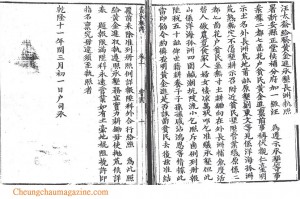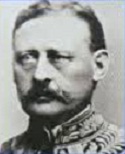1898 Jan 01
Land ownership chaos in New Territories, 1898
1898 Jan 01
Land ownership chaos in New Territories, 1898
After Britian took over New Territories and outlying Islands in 1898, Stewart Lockhart, Colonial Secretary, wrote in 1900 report to government there was too much chaos in Land ownerships in New Territories.
He reported that there were cases involving ill-informed tenants wrongly refusing to pay rent to their Landlords because the lands are in New Territories, and others are to pay rents to the Government.
“Lawless characters also took forcible possession of land and tried to deceive the authority by misrepresentations. Tenants have also endeavoured to usurp the rights of landlords.”
On 20th Oct 1898 , Stewart Lockhart issued a special notice in Chinese to emphasize all landlords and tenants ought to submit land right information to authority.
“Ill-behaved persons will most certainly be severely punished according to law and no leniency will be shown to them. Tremble and obey”
Stewart Lockhart
Colonial Secretary,1900
Please response to this post, your comment is important to us
Cheung Chau in 1898
1898 Oct 01
Cheung Chau in 1898
When Stewart Lockhart, Special Commissioner to Hong Kong , wrote a report to Colonial Office in Oct 1898 after taking over New Territories which includes outlying islands, this is how he described Cheung Chau in his report :
“The Island of Cheung Chau is a busy place, at which many of the steamers, launches, and junks plying between Hong Kong and Macao call.
There is a station of the Chinese Imperial Maritime Customs on the Island, as there is also on the Island of Ma Wan, commonly known as the Kap Shui Mun Station.
The deep anchorage of Cheung Chau affords good shelter, especially during easterly gale.
He also remarked the population of Cheung Chau at 5,000 in 1898, based on the estimate from the officer of the Chinese Imperial Maritime Customs stationed at Cheung Chau.”
But a British, L C Arlington, the expatriate employed by Ching Dynasty as Imperial Maritime Customs Officer stationed at Cheung Chau between 1894-98, recalled a different aspect of life in his book. “The exceptionally strong smell from raw fish and shrimp paste under the sun was almost everywhere on the island. It made him very difficult to set foot on Cheung Chau again after 6 long years of service on the island.”
Chinese Imperial Maritime Customs at Cheung Chau
Please response to this post, your comment is important to us
Land Court , 1900
1900 Jan 01
Land Court , 1900
Since the issue of Chinese Notice in 1899 by the Governor, Henry Blake, informing all land owners in New Territories and Outlying Islands to claim land ownerships, Colonial Government received great amount of land claim disputes, amounting to 69,253 cases, as reported by Stewart Lockhart in his report to Government in 1902.
(參閱 : Ching Dynasty New Territories and outlying islands Land Tenure, before 1898)
Colonial Government enacted the No 18th Ordinance in Hong Kong, the Land Court Ordinance to establish Land Court to handle all theses claim disputes.
Mr. H E Pollock was appointed President, Mr. Gompertz was appointed member, and Mr. Kemp appointed as Registrar.
“ First sitting of Land Court did not take place till 20th February 1901 on Ma Wan Island, then frequent intervals to Cheung Chau and Ping Chau.
Mr. Pollock and me also went to Liyumoon to sit in Chinese Temple for hearing, and Cha Kwo Lang to sit in vacant shop for hearing.” remarked by H H J Gompertz as President of Land Court in report to Colonial Government dated 15th March 1902.
(參閱 : British Colonial Government Policy on land administration in New Territories, 1899)
In 1905, Land Court member J R Wood submitted his report to Colonial Government and listed out the chief problems for settlement :
“Many large tracts of land are now claimed by persons who have never paid Crown Rent on them, who never reported their occupation, such as it was to the authorities, and whose claims have never in any way recognised by the Chinese Government.
Very many persons have been paying under the name of tax annual sums to families who professed to be giving an account of these sum to District Treasury but who as a matter of fact very often did nothing of the kind and who in many cases had no real title to more than a very small fraction of the territory over which they collected this rent. “
J R Wood went on to comment “ The claims to large tracts have for the most part on investigation proved untenable, while the Tax-collecting families or Taxlords, as we have called them., have , where they can show documents in support of their income of any part of it, been provided for in ways appropriate to each case on recommendations of the Court.”

Wong Wai Tsak Tong Clan’s book land title record |

Wong Wai Tsak Tong clan’s book land title record |

Wong Wai Tsak Tong clan’s book land title record |
Please response to this post, your comment is important to us
Land Survey in New Territories, 1900
1900 Jan 01
Land Survey in New Territories, 1900
Stewart Lockhart, mentioned in his report on New Territories dated 8th Oct 1898, that there was urgent need to survey all land in New Territories. It was approved by the Governor.
Mr. Tate and Mr. Newland were put in charge of a team of surveyors and survey collies hired from India, along together with local collies.
In his 1900 January report, Mr. P Tate mentioned land surveying is experiencing no problem in New Territories, mainly as a result of employment of local collies.
But Stewart Lockhart, emphasised in his 1900 report to Governor that it has lot to do with issue of Government Notice in Chinese.
“In fact land surveying also made land owners more positive in registering land titles with Colonial Government in view of the determination shown by the authority in land administration in New Territories.” Stewart Lockhart.
Hong Kong Map in 1898
Please response to this post, your comment is important to us
The number of posts displayed per page : 5







